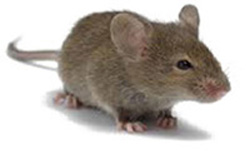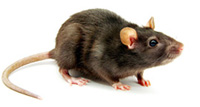
Size:
2 1/2 - 3 3/4" long
Characteristics:
The house mouse is the most common rodent pest in most parts of the world, especially here on Cape Cod. The House Mouse is a small mammal of the order Rodentia, characteristically having a pointed snout, small rounded ears, and a long naked or almost hairless tail. Although a wild animal, the house mouse mainly lives in association with humans.It can breed rapidly and adapt quickly to changing conditions. In fact, a female house mouse can give birth to 6-12 babies every three weeks, and can produce up to 40 young per year.
House mice prefer to eat seeds and insects, but will eat many kinds of food. They are excellent climbers and can jump up to a foot high, however, they are color blind and cannot see clearly beyond six inches.
Color:
Dusty gray with a cream belly.
Habitat:
House mice thrive under a variety of conditions; they are found in and around homes and commercial structures, as well as in open fields and agricultural lands. House mice prefer to nest in dark, secluded areas and often build nests out of paper products, cotton, packing materials, wall insulation and fabrics.
Life Cycle:
House mice usually live less than one year in the wild, due to a high level of predation and exposure to harsh environments. In protected environments, however, they often live two to three years.
Threats:
House mice can sometimes transmit diseases, contaminate food, and damage food packaging. Although the US Centers for Disease Control and Prevention gives a list with diseases transmitted by rodents, only few of the diseases are transmitted through the house mouse.
Micro droplets of mouse urine can cause allergies in children. Mice can also bring fleas, mites, ticks and lice into your home.
Prevention and Control:
To keep mice and other rodents out, make sure all holes of larger diameter than a pencil are sealed. Keep areas clear and store boxes off of the floor because mice can hide in clutter. Don't overlook proper drainage at the foundation and always install gutters or diverts which will channel water away from the building to prevent ideal conditions in which house mice can nest. Regularly inspect the home for signs of mice including droppings, gnaw marks and damaged food goods. If you suspect a rodent infestation, call Fowler and Sons today to perform a complimentary inspection and advise you of the treatment options.





